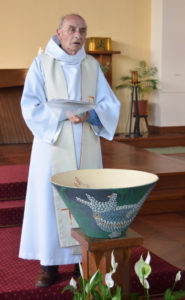The Church, as guardian of the truth, help us discern between good and evil
By Bishop Richard F. Stika

Father Jacques Hamel is seen during a church service June 11 in this handout photo from his parish in Saint-Etienne-du-Rouvray, France. He was killed by two attackers July 26. (CNS photo)
“Begone, Satan!” These were the last words spoken by the French priest Father Jacques Hamel as two ISIS terrorists attacked him while he celebrated Mass in his parish church in July. Pope Francis, referring to Father Jacques as a martyr, would say of the priest in that horrible final moment that he saw with “clarity” the author of evil and clearly accused “the name of his murderer.”
As I reflected on this good priest’s martyrdom at the very altar of sacrifice, I found myself repeating the last words of the Lord’s Prayer, “Deliver us from evil.” With so much confusion in the world, and particularly within our very own country, we must ask ourselves what evil it is that we are seeking deliverance from.
Evil is a great mystery, and while many have tried to explain its existence and even the psychological or social reasons for its manifestation, it is impossible to clearly recognize it apart from God, who alone is the conqueror of evil, and the faith of the Church.
But as society divorces itself more and more from references to God and the light of faith, not surprisingly the Church finds itself increasingly being called “evil” for its beliefs and moral teachings that do not agree with society’s ideas of good and evil. Even religious liberty itself is being attacked and called “code” for discrimination, with the Church being pressured to call “evil good, and good evil” (Isaiah 5:20).
But the Church’s moral teachings will never be subject to popular opinion or majority rule, for God is the “Eternal Legislator,” as St. John Paul II reminds us, and the Church is the guardian of His divine truths.
With a growing loss of the sense of God in society, there is a corresponding loss of the sense of the human person created in God’s image. Catholic author Dr. Peter Kreeft observes that “once ‘God is dead’ to any society or ideology, so is His image of man…. When any culture says no to God, it says no to life…, and becomes a culture of death.” This is an important point for us to consider as we approach our civic duty and vote in the upcoming election.
In this important election year, many have expressed their frustrations to me regarding their serious concerns with each of the presidential candidates, concerns I very much share. My response, though, is to read each candidate’s party platform, which can easily be viewed online. Only then can you get beyond the sound bites and fancy campaign slogans and begin to see where each political party stands on important issues.
Within those platforms you’ll find each party’s stand on important issues, such as abortion and Planned Parenthood, euthanasia and assisted suicide, the death penalty, the election of Supreme Court justices, marriage, immigration reform, the economy, foreign policy and the environment.
For some of these issues, there can be legitimate debate, such as how best to improve the economy and create more jobs, reform of the immigration system, or caring for the environment, to name a few.
But for other issues, such as abortion, embryonic stem cell research, and euthanasia, there can be no debate. Why? It is because these involve the deliberate destruction of human life. We are stewards of life, but we are not its master. You can call it “choice,” but that does not change the fact it is an evil. And on the scale of magnitude —20,000 abortions a week in our country — abortion is truly a genocide.
As we discern our vote, let us recall the warning of St. John Paul II about the importance of properly forming our conscience when he said, “Because of the nature of the conscience, the admonition always to follow it must immediately be followed by the question of whether what our conscience is telling us is true or not. If we fail to make this necessary clarification, conscience — instead of being that holy place where God reveals to us our true good — becomes a force which is destructive of our true humanity and all our relationships.”
As we approach the upcoming election, it is good to remind ourselves that Caesar is not God and that democracy survives only to the degree it is built upon the truth of the human person who is sacred from conception to natural death.
And like Father Jacques Hamel, we must recognize evil and accuse its author.
